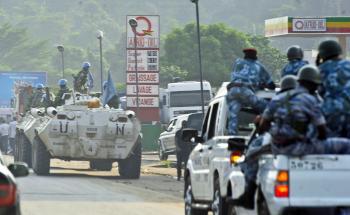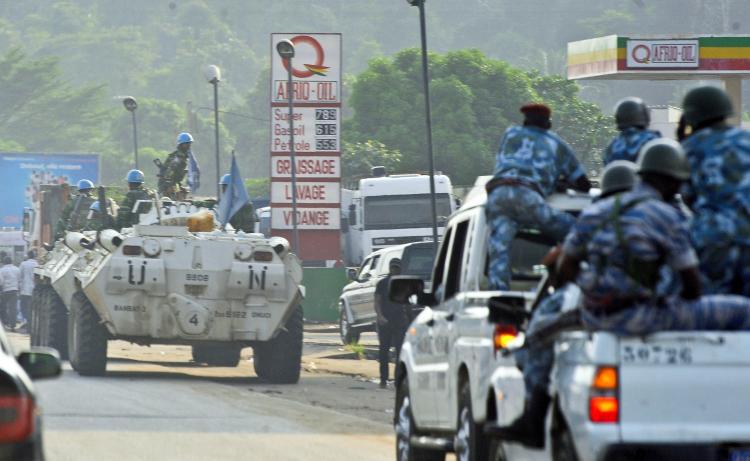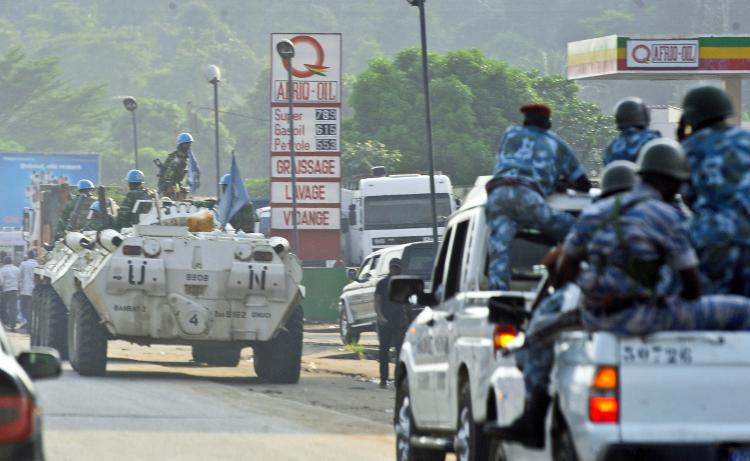About 20,000 people have fled from the Ivory Coast to eastern Liberia to escape the violence that followed November’s presidential elections, the United Nations refugee agency (UNHCR) said Tuesday.
Refugees trekked from the west of the Ivory Coast, (Côte d'Ivoire), taking hours and sometimes days to make the journey, according to UNHCR. Food and housing are problems for the refugees and many children among them are becoming ill with respiratory infections, malaria, and diarrhea.
“The majority of the refugees are women and children, with 62 percent below 18 years of age,” said the agency.
According to the report, refugees “are a mixed group of supporters of both” candidates.
Violence erupted after incumbent President Laurent Gbagbo refused to step down when opposition leader Alassane Ouattara, won the election on Nov. 28.
Over 170 people have been killed so far by security forces loyal to Gbagbo, the U.N. said.
“Between Dec. 16 and 21, human rights officers have substantiated allegations of 173 killings, 90 instances of torture and ill treatment, 471 arrests and detentions, and 24 cases of enforced or involuntary disappearances,” the U.N. Deputy High Commissioner for Human Rights Kyung-wha Kang said last week.
On Tuesday the presidents of Benin, Sierra Leone, and Cape Verde met with Gbagbo to discuss his capitulation, indicating the possibility of a military invasion if the political situation is not resolved, the U.N. said.
The United States and the European Union have also imposed travel sanctions against Gbagbo and his supporters.
Gbagbo has so far shown no signs of backing down. He has retained his power because of loyalty among security forces and the country’s military.
The Central Bank of West African States has cut Gbagbo’s access to Ivorian government accounts to make it difficult for him to pay his security forces. The World Bank has also suspended financing operations and closed its Ivory Coast office.
Human rights groups have reported numerous abductions and murders, and have said that international bodies are not doing enough to prevent the violence.
Though the violence seems to have calmed down, on Dec. 28 a crowd attacked a three-vehicle convoy of United Nations peacekeeping forces in the commercial capital of Abidjan, slashing one soldier with a machete and setting fire to one of the vehicles.
Human Rights Watch (HRW) has spoken with families and neighbors living in pro-Ouattara neighborhoods in the capital of Abidjan, who witnessed pro-Gbagbo security forces and militants raiding homes and taking people away to unknown locations.
Other witnesses spoke of stumbling across bodies riddled with bullets, presumably abductees who had been executed.
“Abducting, disappearing, and killing perceived political opponents are horrific human rights crimes, which can and should be punished,” HRW said last week in a statement.
Amnesty International criticized the U.N. Human Rights Council for not doing more to stop the violence. Though the council did adopt a resolution condemning the killings and abductions, Amnesty says it was not enough.
“The resolution does nothing to impress upon the perpetrators—including the instigators—of the ongoing extrajudicial killings, enforced disappearances, and other human rights violations and abuses that they are, and will be, accountable for their acts,” Amnesty said last week.
Refugees trekked from the west of the Ivory Coast, (Côte d'Ivoire), taking hours and sometimes days to make the journey, according to UNHCR. Food and housing are problems for the refugees and many children among them are becoming ill with respiratory infections, malaria, and diarrhea.
“The majority of the refugees are women and children, with 62 percent below 18 years of age,” said the agency.
According to the report, refugees “are a mixed group of supporters of both” candidates.
Violence erupted after incumbent President Laurent Gbagbo refused to step down when opposition leader Alassane Ouattara, won the election on Nov. 28.
Over 170 people have been killed so far by security forces loyal to Gbagbo, the U.N. said.
“Between Dec. 16 and 21, human rights officers have substantiated allegations of 173 killings, 90 instances of torture and ill treatment, 471 arrests and detentions, and 24 cases of enforced or involuntary disappearances,” the U.N. Deputy High Commissioner for Human Rights Kyung-wha Kang said last week.
On Tuesday the presidents of Benin, Sierra Leone, and Cape Verde met with Gbagbo to discuss his capitulation, indicating the possibility of a military invasion if the political situation is not resolved, the U.N. said.
The United States and the European Union have also imposed travel sanctions against Gbagbo and his supporters.
Gbagbo has so far shown no signs of backing down. He has retained his power because of loyalty among security forces and the country’s military.
The Central Bank of West African States has cut Gbagbo’s access to Ivorian government accounts to make it difficult for him to pay his security forces. The World Bank has also suspended financing operations and closed its Ivory Coast office.
Human rights groups have reported numerous abductions and murders, and have said that international bodies are not doing enough to prevent the violence.
Though the violence seems to have calmed down, on Dec. 28 a crowd attacked a three-vehicle convoy of United Nations peacekeeping forces in the commercial capital of Abidjan, slashing one soldier with a machete and setting fire to one of the vehicles.
Human Rights Watch (HRW) has spoken with families and neighbors living in pro-Ouattara neighborhoods in the capital of Abidjan, who witnessed pro-Gbagbo security forces and militants raiding homes and taking people away to unknown locations.
Other witnesses spoke of stumbling across bodies riddled with bullets, presumably abductees who had been executed.
“Abducting, disappearing, and killing perceived political opponents are horrific human rights crimes, which can and should be punished,” HRW said last week in a statement.
Amnesty International criticized the U.N. Human Rights Council for not doing more to stop the violence. Though the council did adopt a resolution condemning the killings and abductions, Amnesty says it was not enough.
“The resolution does nothing to impress upon the perpetrators—including the instigators—of the ongoing extrajudicial killings, enforced disappearances, and other human rights violations and abuses that they are, and will be, accountable for their acts,” Amnesty said last week.






